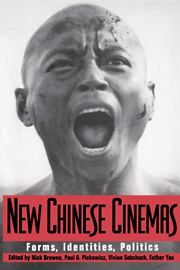Book contents
- Frontmatter
- Contents
- List of Illustrations
- List of Contributors
- Acknowledgments
- Note on the Romanization of Chinese
- Introduction
- I FILM IN THE PEOPLE'S REPUBLIC
- II FILM IN TAIWAN AND HONG KONG
- 5 Remapping Taipei
- 6 The Ideology of Initiation
- 7 The Return of the Father
- 8 Border Crossing
- 9 Two Films from Hong Kong
- Chronologies
- Glossary
- Scholarly Works on Chinese Filmmaking in the 1980s
- Index
7 - The Return of the Father
Hong Kong New Wave and Its Chinese Context in the 1980s
Published online by Cambridge University Press: 05 June 2012
- Frontmatter
- Contents
- List of Illustrations
- List of Contributors
- Acknowledgments
- Note on the Romanization of Chinese
- Introduction
- I FILM IN THE PEOPLE'S REPUBLIC
- II FILM IN TAIWAN AND HONG KONG
- 5 Remapping Taipei
- 6 The Ideology of Initiation
- 7 The Return of the Father
- 8 Border Crossing
- 9 Two Films from Hong Kong
- Chronologies
- Glossary
- Scholarly Works on Chinese Filmmaking in the 1980s
- Index
Summary
A review of Hong Kong cinema in the 1980s must begin with the rise of the Hong Kong “new wave” in 1979. The achievements of this new wave are patently not up to those of the new cinemas of mainland China and Taiwan. It did not produce directors of the caliber of Hou Hsaio-hsien (Hou Xiaoxian), Edward Yang (Yang Dechang), Chen Kaige, or Tian Zhuangzhuang – or works with serious historical resonances such as the masterpieces City of Sadness [Beiqing chengshi, 1989], Taipei Story [Qingmei zhuma, 1985], Yellow Earth [Huang tudi, 1985], and Horse Thief [Daomazei, 1986]. In the context of Hong Kong cinema, however, the importance and influence of the Hong Kong new wave – whether in terms of the systematic industrialization of the 1980s, modes of creativity, film culture, or its dialectic with tradition – cannot be underestimated.
Even before it became a reality, the Hong Kong new wave – unlike the new cinemas of China and Taiwan – was eagerly awaited and anticipated by critics. This was not only because the new wave directors, including Ann Hui (Xu Anhua), Allen Fong (Fang Yuping), Patrick Tarn (Tan Jiaming), Tsui Hark (Xu Ke), Yim Ho (Yan Hao), and Alex Cheung (Zhang Guoming), were recognized as a new generation of filmmakers who had undergone vocational training in film schools in the West, but also because they had the opportunity to display their talent in television before they entered the film industry.
- Type
- Chapter
- Information
- New Chinese CinemasForms, Identities, Politics, pp. 160 - 179Publisher: Cambridge University PressPrint publication year: 1994
- 5
- Cited by



